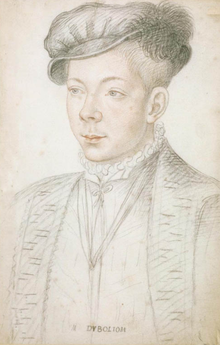Henri-Robert de La Marck | |
|---|---|
| Duc de Bouillon | |
 Portrait of the Duke of Bouillon | |
| Other titles | Governor of Normandy Prince of Sedan |
| Born | 1539 Kingdom of France |
| Died | 2 December 1574 Kingdom of France |
| Family | House of La Marck |
| Spouse(s) | Françoise de Bourbon |
| Issue | Guillaume-Robert de La Marck Charlotte de La Marck |
| Father | Robert IV de La Marck |
| Mother | Françoise de Brézé |
Henri-Robert de La Marck (c. 1539–2 December 1574) was a French noble, sovereign prince and governor of Normandy. Ascending to the high office of governor of Normandy on the death of his father shortly after his return from captivity, Bouillon found himself in financial trouble, ruined by the debt from his father’s ransom. With the death of Henri II in 1559 and the disgrace of his patron Diane de Poitiers Bouillon found his position in Normandy tenuous. Bouillon converted to Protestantism in 1561, as much of the Norman nobility had in the prior years, Bouillon however had little interest in leading them.
When civil war broke out in 1562, Bouillon did not join Condé and his co-religionists in their rebellion, instead following a path of neutrality. When Aumale was granted a special commission to subdue the Protestants of Normandy, Bouillon took up arms against him without joining the Protestant forces of Rouen, creating a third side to the conflict in the province. Subsequently, he was deprived of his office as governor of Normandy, until by the successful campaign of Aumale and Montpensier it was restored to him in June 1564. Later that month he attempted to assert his authority in Rouen however his decrees were reversed by the crown, and feeling powerless he withdrew to his power base in the Ardenne.
In 1566 he found himself involved with the Protestants of the Spanish Netherlands hoping to get them to rise against Spain. In 1572 he was in Paris when the Massacre of Saint Bartholomew unfolded, and avoided being murdered through a promise of conversion to Catholicism. The following year he had reversed on this and was suspected of involvement with the Malcontents before he died in late 1574.